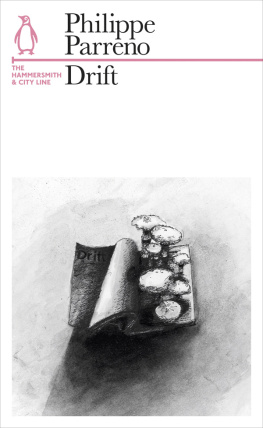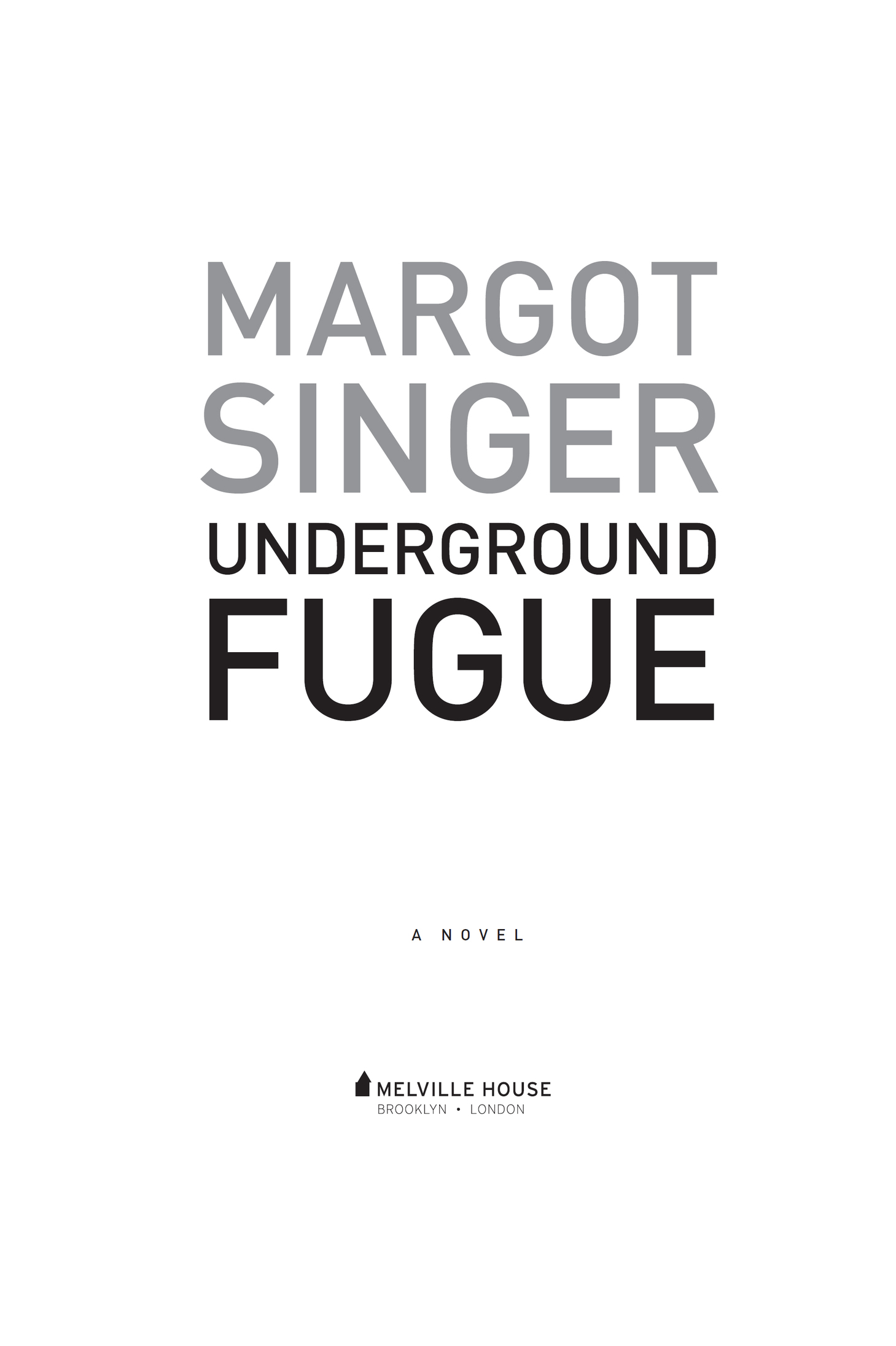Contents
UNDERGROUND FUGUE
Copyright 2017 by Margot Singer
First Melville House Printing: April 2017
| Melville House Publishing | 8 Blackstock Mews |
| 46 John Street | and | Islington |
| Brooklyn, NY 11201 | London N4 2BT |
mhpbooks.com facebook.com/mhpbooks @melvillehouse
Die Sonette an Orpheus by Rainer Maria Rilke,
first published 1923 by Insel-Verlag. Germany.
Library of Congress Cataloging-in-Publication Data
Names: Singer, Margot, author.
Title: Underground fugue : a novel / Margot Singer.
Description: Brooklyn; London : Melville House, [2017]
Identifiers: LCCN 2016044061| ISBN 9781612196282 (hardback) |
ISBN 9781612196299 (ebook)
Subjects: LCSH: Domestic fiction. | BISAC: FICTION / Political.
| FICTION / Jewish. | FICTION / Sagas. | GSAFD: Suspense fiction.
Classification: LCC PS3619.I572447 U53 2017 | DDC 813/.6dc23
LC record available at https://lccn.loc.gov/2016044061
Ebook ISBN9781612196299
v4.1
a
Mamour, mamour
what do I love and
where are you?
That I lost my center
fighting the world.
The dreams clash
and are shattered
and that I tried to make a paradiso
terrestre.
EZRA POUND , Notes for Canto 117 et seq.
No one sees him fall or jump. No one sees him swim, shoes awkward in his hands, arms stretched above the swell. No one sees him splash onto the shore, the loose stones giving way beneath his feet. He simply appears as if from nowhere, a lone figure stumbling along the beachfront road near Sheerness: dripping wet, barefoot, dressed in a white shirt and formal suit.
In the midnight stillness, the sea and sky hang gray along the shadowline of the coast. From here at the mouth of the estuary, the North Sea stretches eastward to the rim of the horizon and beyond it to the continent: Ostend, Zeebrugge, Dunkirk. Only on this night theres no horizon, just one flat, unbroken surface, water indistinguishable from air. Theres just the throaty hiss of waves on pebbles, drawing near and then receding, like a lapping beast. Points of light flicker on the headland. The grayness hovers: an erasure, a wiped slate.
The police car slows, the drivers window opens, an arm extends. A head cranes out.
Oi! You! Whats your name?
The man half turns and shies away, continues walking. He walks with his head tilted, carrying his shoes. Hes a piece of flotsam, washed up, mute. He looks blurred around the edges, drained of color, a charcoal rubbing in tones of gray.
At the hospital he shivers beneath a blanket, unyielding as a wave-washed stone. His pockets contain nothing. The labels have been cut out of all his clothes. On the inside collar of his jacket there are just two stubs of fabric, looped with thread. At the neck of his shirt, a jagged hole. On the waistband of his trousers, the perforated outline of a square. All identifying marks have been rubbed off his shoes. His gaze slips sideways. He has no notable scars or birthmarks, fillings or tattoos. He does not speak. He has no language, no history, no memory, no name.
In the photograph that will run in all the papers, the camera has caught him standing in a grove of trees outside the hospital, wearing that black suit, that white shirt buttoned to the neck, clutching a plastic folder of sheet music to his chest. Tall and thin, he stands slightly hunched. He has cropped blond hair, a pale prickling of beard. The sun is at his back, whiting out his head and shoulders in a blaze of light. He takes on the colors of his surroundings, like a container made of glass.
The expression in his eyes is what you will remember. It is both vulnerable and wary, pleading and accusing, as if hes begging you to look away, to leave him be. But in the instant of the shutters click, everything has changed. He has been transformed into a body of pure speculation: a plot to be unraveled, a projection of your desire, a myth.
Given a pad and pencil, he sketches a grand piano, all eighty-eight keys in fine detail, the lid raised like a wing. On the old upright in the mental hospital chapel, he plays the Moonlight Sonata, some Lennon and McCartney tunes, the theme from Tchaikovskys Swan Lake. He plays for hours, his body swaying, his fingers tracing patterns along the keys: chord progressions, arpeggios, halftones, quavers, counterpoint.
Listen: everything you want to know is in the music.
The voices rise and fall, call and answer, take flight.
ONE
ESTHER
T he plane descends toward Heathrow on a cold, gray April morning. It is just past 6:00 a.m. in London and Esther has traveled through the night, shed five hours of it over the Atlantic, and now her eyes feel loosened in their sockets and her feet are swollen and everything is vibrating with fatigue. She rests her forehead against the window. Square green fields bisected by hedgerows, snaking subdivisions of redbrick houses, rain-wet motorways, tiny cars. The landing gear whirrs. The flaps adjust.
She folds her arms across her chest, crosses her fingers, tucks her thumbs into her palms for luck. A useless superstition. The man seated beside her doesnt seem to notice. He is an American, a petroleum engineer, he told her back in the friendly moments at the beginning of the flight before he fell asleep. Hes on his way to a rig in the North Sea. Something to do with pressure control valve design. Hated traveling, he told her. Didnt like to be away from his wife and kids. He barely fits into the coach class seat, overlapping its borders like an adult wedged into a childs chair on parents night at school. He fell asleep quickly, the dinner trays not yet cleared away, the cabin still abuzz. At one point in the night his head lolled onto her shoulder, heavy as a melon, trusting as a sleeping child in the strange intimacy of strangers on transatlantic flights.
Esther used to love to fly. She loved the promise of the city names clicking over on the departure boards, the way the syllables turned over on her tongue: Dar es Salaam, Helsinki, Riyadh, La Paz, Berlin. She loved the weightless lift of takeoff, the earth dropping away and spreading out below, the bunting of clouds, the sun appearing like a gift. She misses it, that lightness she once felt at thirty-six thousand feet, the substance of her life below as unreal as the vanished earth beneath the strange cloud sea. But now she knows shed mistaken the illusion of lightness for possibility. Shed thought that if you kept moving forward, you could leave the past behind.
Rain spatters against the windows. They are low now, nearly there, the squat terminal buildings and hangars stretching larger, into scale. The blue blink of runway lights. Then the thump of the wheels on tarmac, the chest-slam of the reverse-engine thrust. She uncrosses her fingers and arms. On the ground now, the jet lumbers, awkward on its little wheels.
The engineer bends and lifts his duffle bag onto his lap. He has to catch a connection to Aberdeen, he has told her, then hop a helicopter to the rig. Shes seen pictures of those wave-battered platforms, those men in orange coveralls, the men who kept the oil pumping, the oil that wars were fought for, that viscous bloodline deep beneath the sea.















